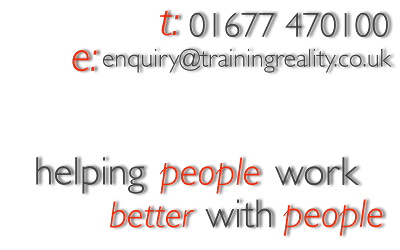Please press (at least!) one of these.
It costs you nothing, and (possibly) helps us spread the word!
I “do” it my way
Tuesday, 20 October 2009
One problem I’ve personally faced (and continue to face), and one that I regularly see in a number of contexts, is the challenge of being able to step back, bite your lip, and back off when you see something that you are great at being done in a different way to yours. In the organisations we work with, this is often the case with new managers with their first experience of people responsibility; owner-managers of growing businesses who need to let go of the reins a little; boards of directors who need to begin the process of developing their successors; and many, many more situations.
The difficulty for people in this situation can be broken down into a number of areas, and each one addressed in slightly different ways. I don’t think it’s ever going to be an easy thing to do in all circumstances (if it was, I’d never see it as an issue on training courses - and it comes up regularly!), but I’m certain that it is do-able, and that it is one of the most important personal development steps that are needed as you move up an organisation, or as an organisation itself grows and develops.
“I’m a control freak”
The great part about this statement is the acknowledgment not only of the problem, but also for where the responsibility lies. I know, for example, that there are some aspects of my life where I’m a bit of a control freak - the fire in the living room has to be set in a certain way, the car has to be washed “just like this” - and I know that I’m the only person who can (if I choose!) do something about it.
A solution that I use to help me deal with this is to ask the question why. Why does it need to be done this way or that? Why is my route the only route to take? Why is taking my route important? Often, the answer is actually more about the achievement of the goal, rather than being about the path to that goal (it’s the best way to do it), and can be based on a narrow view of what is right, and a limited range of experiences.
Challenge yourself: if the goal is what is important (a quickly-roaring fire or a pristine and shiny car), who really cares how it is done?
“They don’t do it right”
This is a little trickier, because it contains the (only slightly) hidden assumption that your method is correct and theirs isn’t. Therefore in addition to the final step discussed above (focusing on the goal rather than the methodology), there is an interim step that needs to analyse the relative value of different approaches.
In these circumstances, an analytical approach to understanding the pros and cons of your approach, the approach of the other party, and, indeed, a whole variety of different approaches is needed. It is unlikely (let’s face it) that your method is absolutely perfect, and it is reasonably likely that there are aspects of others’ methods that could improve yours. Be observant, look for them, and view it as yet another step in your personal development.
Challenge yourself: what is good and bad about my approach, their approach, and the approach of everyone else?
“My way is better”
This is very similar to the category above, but comes at it from a slightly different angle. The critical missing information here is the answer to the question “in what way?”. Is your way faster, cheaper, less resource-intensive, higher quality, more eco-friendly, more fun?
The first step here is to be much, much more specific - in which ways is my way really better? It is unlikely to be better in every single way (there are usually trade-offs - price versus quality; speed versus accuracy and so on), and it could be the case that your way is better on some measures, but also that other ways are better on other measures. Deciding what is really important and being crystal clear about the benefits and drawbacks of different options and choices creates much better decisions.
Challenge yourself: Is your way better in every single way and on every possible different measure than someone elses?
--
Next week, I’m going to look at three further arguments for “doing it my way”:
“I’m held responsible”, “They won’t do it at all”, and “If they do it, what do I do?”
Please press (at least!) one of these.
It costs you nothing, and (possibly) helps us spread the word!





